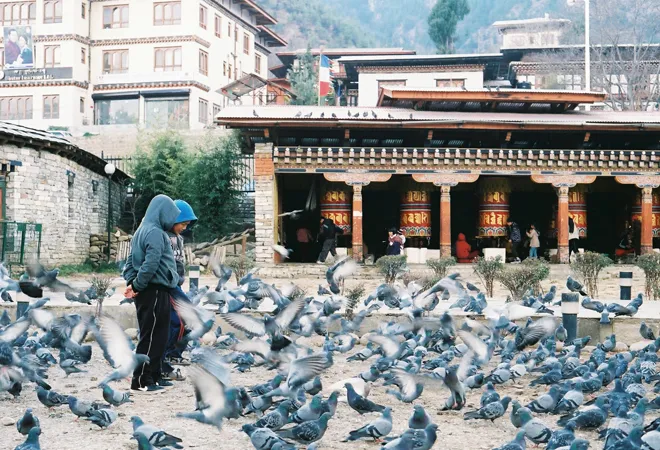
India’s Foreign Secretary, S. Jaishankar, paid a significant four-day visit to Bhutan from 2 October. This was the first visit by a senior Indian official since the Doklam crisis that saw Beijing and New Delhi at loggerheads in the longest border standoff in their history. Jaishankar met King Jigme Kheshar Namgyal Wangchuck, Prime Minister Tshering Tobgay and Foreign Minister Damcho Dorji, among other dignitaries.
Like any other India-Bhutan summit, the visit of the foreign secretary underscored India’s commitment towards the development of her Himalayan neighbour. According to an India’s Ministry of External Affairs’ release, during the Foreign Secretary’s visit, deliberations were held on the implementation of the ongoing India assisted projects under Bhutan’s 11th Five Year Plan and its priorities for the 12th Five Year Plan. The release also said that trade and economic ties, hydropower cooperation and people to people ties were discussed, along with other areas of bilateral interest.
Like any other India-Bhutan summit, the visit of the foreign secretary underscored India’s commitment towards the development of her Himalayan neighbour.
The India-Bhutan relations will complete 50 years in 2018. Now, it should continue to build on the vision expressed by Prime Minister Narendra Modi — ‘Bharat to Bhutan (B2B)’. During his visit to Thimphu in 2014, Modi had said: “Bharat should stand for Bhutan and Bhutan for India.” The foreign secretary’s visit must be seen in the light of this mutual necessity for both nations, especially in the wake of China flexing its muscle and entering South Asia, the latter, being India’s sphere of influence.
Eye on China
China, the northern neighbour, is keen on formalising its relations with Bhutan. China is the only country that Bhutan still has no formal relations. It was the annexation of Tibet by China that saw Bhutan enter into formal relations with India. Bhutan was also concerned by India’s annexation of Sikkim, but was less threatened as it had by then consciously become the member of the United Nations and begun developing her foreign relations.
Pitted against two large neighbours, Bhutan is sensitive of threat from her neighbours. Events in the recent past, particularly the Doklam standoff, has put India’s strategic ambitions under scanner in Thimphu. Undoubtedly, Bhutan wanted an end to the border standoff, as it might affect Bhutan-China border talks and defer resolution of the border dispute.
Pitted against two large neighbours, Bhutan is sensitive of threat from her neighbours. Events in the recent past, particularly the Doklam standoff, has put India’s strategic ambitions under scanner in Thimphu.
During the prolonged Doklam crisis also, the Bhutanese establishment remained astonishingly silent, except for an isolated statement by Bhutan’s envoy to New Delhi, who blamed China of building a road in their territory. Though it maintained a perturbed silence in public, Thimphu engaged in intense negotiations with New Delhi, and it hoped that New Delhi’s assistance would sort out issues. Civil society in Thimphu was concerned about the threat to its sovereignty because of the geo-strategic ambitions of the two larger neighbours.
The visit of the Indian foreign secretary is likely to have assured and convinced Bhutan that the strategic interests of India and Bhutan are intertwined. China’s increasing sphere of influence in the Indian sub-continent makes Thimphu stand out as the only fender. Despite India’s steadfast support to many nations, including Nepal, countries in the neighbourhood have used the China card against India. Bhutan is the only country that has not done so and New Delhi would like to ensure that Thimphu never does. This would largely bear over India’s Bhutan policy and was reported to be on the agenda of the visiting foreign secretary.
Anti-incumbency wave
Bhutan would be going for general elections in early next year. And the incumbent Tshering Tobgay government is struggling against an anti-incumbency wave. Ever since the transition to democracy in the kingdom from 2008, a new class of conscious civil society has emerged who are subjecting the government policies to the highest criticism.
The government has drawn flak for entering into international agreements, ignoring the business interests of the country. A glaring example of this was the government’s signing of the BBIN Motor Vehicles Agreement (MVA), that was later reverted by the National Council due to opposition from the stakeholders especially from country’s truckers and taxi associations. Bhutan later withdrew from the MVA for non-ratification of the agreement in the parliament.
The steep increase in the costs of ongoing hydro-power projects due to delay in the construction and the uncertainty over large projects like Sankosh or Kuri Gongri have led to a massive reduction in the hydropower target, from the 2014 target of 10,000 MW by 2020 to 5,000 MW by 2021 now. The introduction of GST by India has resulted in losses for Bhutanese traders. Bhutan has already asked India to offset the losses incurred by the traders.
India would have to respond to the interests of Bhutan towards security, economic stability and uninterrupted development for which Thimphu looks towards its southern neighbour. The foreign secretary’s visit would have touched upon all these aspects to make PM Modi’s vision of ‘Bharat to Bhutan’ a reality.
The views expressed above belong to the author(s). ORF research and analyses now available on Telegram! Click here to access our curated content — blogs, longforms and interviews.



 India’s Foreign Secretary, S. Jaishankar, paid a significant four-day visit to Bhutan from 2 October. This was the first visit by a senior Indian official since the Doklam crisis that saw Beijing and New Delhi at loggerheads in the longest border standoff in their history. Jaishankar met King Jigme Kheshar Namgyal Wangchuck, Prime Minister Tshering Tobgay and Foreign Minister Damcho Dorji, among other dignitaries.
Like any other India-Bhutan summit, the visit of the foreign secretary underscored India’s commitment towards the development of her Himalayan neighbour. According to an India’s Ministry of External Affairs’ release, during the Foreign Secretary’s visit, deliberations were held on the implementation of the ongoing India assisted projects under Bhutan’s 11th Five Year Plan and its priorities for the 12th Five Year Plan. The release also said that trade and economic ties, hydropower cooperation and people to people ties were discussed, along with other areas of bilateral interest.
India’s Foreign Secretary, S. Jaishankar, paid a significant four-day visit to Bhutan from 2 October. This was the first visit by a senior Indian official since the Doklam crisis that saw Beijing and New Delhi at loggerheads in the longest border standoff in their history. Jaishankar met King Jigme Kheshar Namgyal Wangchuck, Prime Minister Tshering Tobgay and Foreign Minister Damcho Dorji, among other dignitaries.
Like any other India-Bhutan summit, the visit of the foreign secretary underscored India’s commitment towards the development of her Himalayan neighbour. According to an India’s Ministry of External Affairs’ release, during the Foreign Secretary’s visit, deliberations were held on the implementation of the ongoing India assisted projects under Bhutan’s 11th Five Year Plan and its priorities for the 12th Five Year Plan. The release also said that trade and economic ties, hydropower cooperation and people to people ties were discussed, along with other areas of bilateral interest.
 PREV
PREV


